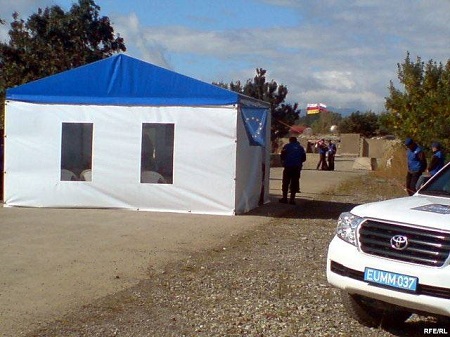Hard Easter ahead for Georgians along the Russian occupation line

Citizens of Georgia living near the occupation line with Tskinvali (South Ossetia) region will have no chance of celebrating the upcoming Easter on April 12 as tradition calls to honour their loved ones.
As it was centuries ago in Georgia, Orthodox Christians will visit the graves of their beloved and also take part in a holy liturgy at their local churches.
Several cemeteries and churches are now isolated from villages after barbed wire fences were installed along the so-called Administrative Boundary Line.
Many loved ones are laid to rest in the Zemo Khurvaleti village cemetery, which is now isolated from the village itself as it now sits behind barbed wire fences erected by Russian and Ossetian border guards. Similar circumstances are evident at the Zeda Adzvi village, where St. George Church - a historical place of worship – now lies on Georgia’s uncontrolled territory.
Negotiations on possible arrangements to facilitate visits to cemeteries and religious sites over the upcoming Easter period were unsuccessful. The 53rd meeting of the Incident Prevention and Response Mechanism (IPRM) was held in Ergneti yesterday.

This is not the first time when so-called South Ossetian authorities have rejected a proposal on behalf the Georgian side before Easter.
The head of the Analytical Department of Georgia’s Ministry of Internal Affairs Shalva Enukidze said that despite the denial of de facto South Ossetian authorities to give locals the possibility to visit cemeteries and other religious sites during Easter, the Georgian side will continue negotiations with the hope of reaching consensus.
This is not the first time when so-called South Ossetian authorities have rejected a proposal on behalf the Georgian side before Easter.
The other important topic of the Ergneti meeting was the situation regarding prisoners and missing persons.
The Georgian side discussed the possibility to free seven citizens of Georgia currently detained in Tskinvali’s prison. South Osssetian representatives demanded the exchange of prisoners "all for all”.
But representative of Georgia’s Ministry of Internal Affairs said those in Georgian jails were facing "hard terrorism charges” while the most typical reason for detention of Georgians was "illegally crossing” the Administrative Boundary Line.
The Ergneti meeting under the Incident Prevention and Response Mechanism (IPRM) was co-facilitated by KÄstutis Jankauskas, the head of the EU Monitoring Mission in Georgia (EUMM), and Ambassador Angelo Gnaedinger, the Special Representative of the OSCE Chairperson-in-office for the South Caucasus.
The next negotiations are scheduled in Ergneti for April 29.
 Tweet
Tweet  Share
Share